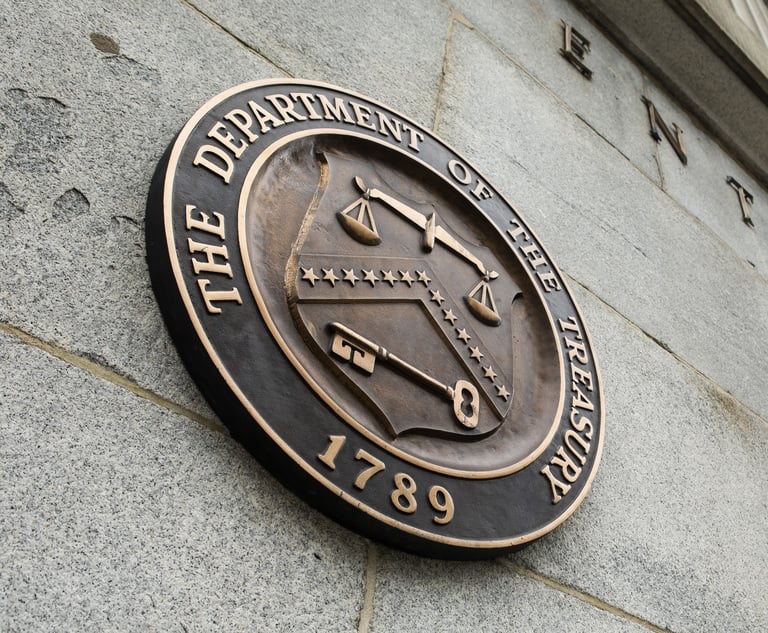High Court: Discrimination 'Because of Sex' Under Title VII Encompasses Sexual Orientation, Transgender Status
On June 15, the court answered that question as to all three cases in Bostock v. Clayton County, Georgia, holding that an employer who fires an individual merely for being gay or transgender violates Title VII.
June 16, 2020 at 12:45 PM
6 minute read
 Robin Bresky and Randall Burks, The Law Offices of Robin Bresky, Boca Raton. (Photo: Courtesy Photo)
Robin Bresky and Randall Burks, The Law Offices of Robin Bresky, Boca Raton. (Photo: Courtesy Photo)Last November we reported on three related cases that were pending in the U.S. Supreme Court, in which the court would decide whether Title VII of the Civil Rights Act of 1964 protects employees from discrimination on the basis of sexual orientation and transgender status. Specifically, the question was whether discrimination "because of sex" under Title VII encompasses those characteristics.
On June 15, the court answered that question as to all three cases in Bostock v. Clayton County, Georgia, holding that an employer who fires an individual merely for being gay or transgender violates Title VII.
The Supreme Court's decision affirmed an opinion of the U.S. Court of Appeals for the Second Circuit that had allowed a Title VII suit to proceed where a skydiving instructor was fired after mentioning that he was gay. The Supreme Court also affirmed a decision of the Sixth Circuit allowing a Title VII action to go forward where a funeral home fired an employee who had presented as a male but later informed the employer of an intention to live and work as a woman.
The Supreme Court reversed an Eleventh Circuit decision that held that there is no cause of action for sexual orientation discrimination under Title VII and that approved the dismissal of a suit by a county welfare advocate who was fired after community members made disparaging remarks about his sexual orientation and participation in a gay recreational softball league.
Justice Neil Gorsuch delivered the decision of the court with a 33-page opinion explaining that discrimination on the basis of sexual orientation or gender identity is indeed "because of … sex" as contemplated by the actual text of Title VII, because "an employer who fires an individual for being homosexual or transgender fires that person for traits or actions it would not have questioned in members of a different sex. Sex plays a necessary and undisguisable role in the decision, exactly what Title VII forbids."
The court noted that Title VII used "broad language making it illegal for an employer to rely on an employee's sex when deciding to fire that employee. We do not hesitate to recognize today a necessary consequence of that legislative choice: An employer who fires an individual merely for being gay or transgender defies the law."
The employers in the three cases argued in the Supreme Court that the "original public meaning" of the phrase "because of … sex" in Title VII, as understood when it was enacted, referred to "sex" as in being born a man or woman, not the man or woman's sexual orientation or transgender status. The employers argued that today's courts are bound by that meaning as understood by Congress in 1964.
The Supreme Court rejected the employers' arguments as to legislative history and the purported "original public meaning" of Title VII. The court stated that "legislative history has no bearing here, where no ambiguity exists about how Title VII's terms apply to the facts." The court focused on the plain meaning of the text itself. Gorsuch wrote that "the limits of the drafters' imagination supply no reason to ignore the law's demands. When the express terms of a statute give us one answer and extratextual considerations suggest another, it's no contest. Only the written word is the law, and all persons are entitled to its benefit."
Justice Samuel Alito filed a lengthy dissenting opinion in which Justice Clarence Thomas joined. In their view, the majority opinion inappropriately departs from the original intent of Congress and is illogical because sex, sexual orientation and gender identity are "different concepts," and "discrimination because of sexual orientation or gender identity does not in and of itself entail discrimination because of sex." Alito recognized, however, the importance of treating "individuals who are gay, lesbian, or transgender … with the dignity, consideration, and fairness that everyone deserves."
Justice Brett Kavanaugh filed a separate dissenting opinion fully agreeing with the court's declaration in a 2018 decision that LGBT people "cannot be treated as social outcasts or as inferior in dignity and worth." Yet, he argued that the plaintiffs were seeking a judicial expansion of the scope of Title VII, whereas "under the Constitution's separation of powers, the responsibility to amend Title VII belongs to Congress and the president in the legislative process, not to this court."
By contrast, the majority concluded that the existing written word of Title VII shows that, "when an employer fires an employee for being homosexual or transgender, it necessarily and intentionally discriminates against that individual in part because of sex," and "the plaintiff's sex need not be the sole or primary cause of the employer's adverse action."
The specific holding of the Supreme Court's June 15 opinion is that "employers are prohibited from firing employees on the basis of homosexuality or transgender status," but Alito's dissent suggested that "the entire Federal Judiciary will be mired for years in disputes about the reach of the court's reasoning." We predict that the lower courts will broaden the holding to recognize that Title VII protects LGBT employees not only from being fired "because of … sex," but also from suffering other aspects of employment discrimination under Title VII, which makes it "unlawful … for an employer to fail or refuse to hire or to discharge any individual, or otherwise to discriminate against any individual with respect to his compensation, terms, conditions, or privileges of employment."
Robin Bresky and Randall Burks of The Law Offices of Robin Bresky in Boca Raton are appellate attorneys who handle appeals and litigation support in federal and state courts in Florida. Contact them at [email protected].
This content has been archived. It is available through our partners, LexisNexis® and Bloomberg Law.
To view this content, please continue to their sites.
Not a Lexis Subscriber?
Subscribe Now
Not a Bloomberg Law Subscriber?
Subscribe Now
NOT FOR REPRINT
© 2025 ALM Global, LLC, All Rights Reserved. Request academic re-use from www.copyright.com. All other uses, submit a request to [email protected]. For more information visit Asset & Logo Licensing.
You Might Like
View All

Don’t Forget the Owner’s Manual: A Guide to Proving Liability Through Manufacturers’ Warnings and Instructions
5 minute read

Trending Stories
- 15th Circuit Considers Challenge to Louisiana's Ten Commandments Law
- 2Crocs Accused of Padding Revenue With Channel-Stuffing HEYDUDE Shoes
- 3E-discovery Practitioners Are Racing to Adapt to Social Media’s Evolving Landscape
- 4The Law Firm Disrupted: For Office Policies, Big Law Has Its Ear to the Market, Not to Trump
- 5FTC Finalizes Child Online Privacy Rule Updates, But Ferguson Eyes Further Changes
Who Got The Work
J. Brugh Lower of Gibbons has entered an appearance for industrial equipment supplier Devco Corporation in a pending trademark infringement lawsuit. The suit, accusing the defendant of selling knock-off Graco products, was filed Dec. 18 in New Jersey District Court by Rivkin Radler on behalf of Graco Inc. and Graco Minnesota. The case, assigned to U.S. District Judge Zahid N. Quraishi, is 3:24-cv-11294, Graco Inc. et al v. Devco Corporation.
Who Got The Work
Rebecca Maller-Stein and Kent A. Yalowitz of Arnold & Porter Kaye Scholer have entered their appearances for Hanaco Venture Capital and its executives, Lior Prosor and David Frankel, in a pending securities lawsuit. The action, filed on Dec. 24 in New York Southern District Court by Zell, Aron & Co. on behalf of Goldeneye Advisors, accuses the defendants of negligently and fraudulently managing the plaintiff's $1 million investment. The case, assigned to U.S. District Judge Vernon S. Broderick, is 1:24-cv-09918, Goldeneye Advisors, LLC v. Hanaco Venture Capital, Ltd. et al.
Who Got The Work
Attorneys from A&O Shearman has stepped in as defense counsel for Toronto-Dominion Bank and other defendants in a pending securities class action. The suit, filed Dec. 11 in New York Southern District Court by Bleichmar Fonti & Auld, accuses the defendants of concealing the bank's 'pervasive' deficiencies in regards to its compliance with the Bank Secrecy Act and the quality of its anti-money laundering controls. The case, assigned to U.S. District Judge Arun Subramanian, is 1:24-cv-09445, Gonzalez v. The Toronto-Dominion Bank et al.
Who Got The Work
Crown Castle International, a Pennsylvania company providing shared communications infrastructure, has turned to Luke D. Wolf of Gordon Rees Scully Mansukhani to fend off a pending breach-of-contract lawsuit. The court action, filed Nov. 25 in Michigan Eastern District Court by Hooper Hathaway PC on behalf of The Town Residences LLC, accuses Crown Castle of failing to transfer approximately $30,000 in utility payments from T-Mobile in breach of a roof-top lease and assignment agreement. The case, assigned to U.S. District Judge Susan K. Declercq, is 2:24-cv-13131, The Town Residences LLC v. T-Mobile US, Inc. et al.
Who Got The Work
Wilfred P. Coronato and Daniel M. Schwartz of McCarter & English have stepped in as defense counsel to Electrolux Home Products Inc. in a pending product liability lawsuit. The court action, filed Nov. 26 in New York Eastern District Court by Poulos Lopiccolo PC and Nagel Rice LLP on behalf of David Stern, alleges that the defendant's refrigerators’ drawers and shelving repeatedly break and fall apart within months after purchase. The case, assigned to U.S. District Judge Joan M. Azrack, is 2:24-cv-08204, Stern v. Electrolux Home Products, Inc.
Featured Firms
Law Offices of Gary Martin Hays & Associates, P.C.
(470) 294-1674
Law Offices of Mark E. Salomone
(857) 444-6468
Smith & Hassler
(713) 739-1250






